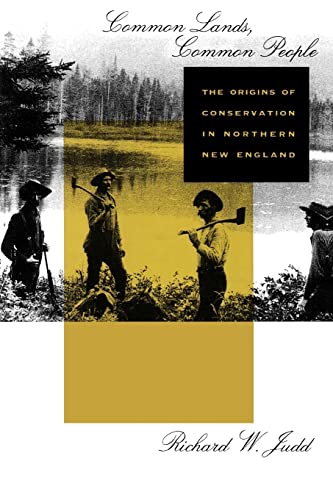Críticas:
As Common Lands, Common People describes beautifully, the march of 'progress' [in New England] was slowed by the nascent environmentalists of Maine, Vermont and New Hampshire standing up to big businesses of the day. The beauty of these states today is thanks to the pressure of these early conservationists--who were not, the author suggests, an elitist group drawn from the upper echelons of society as some historians contend, but the 'common people' of the title. The writing is vivid and the history thorough. New Scientist This book offers an important new view of the history of environmentalism in the United States that focuses on northern New England, including Massachusetts, from the late eighteenth century to the Progressive reforms of the early twentieth century...By focusing on the attitudes of the common people who lived and worked the land as well as the adjacent forests and waterways, Judd offers a useful corrective to our prevailing understanding, which sees the consecration movement primarily as an expression of elite concerns. This is a most interesting and informative study of the political economy of nature, the origins of conservation, and the multiple uses of natural resources. -- Hal S. Barron American Historical Review A well-written, detailed analysis of the rise of a conservation ethic in northern New England. Judd weaves the natural history of the land and water with mid-19th-century culture superbly...This historical account will be very valuable to anyone who is interested in land use, conservation, and public attitudes toward nature, and believes that the past plays a significant role in the present and future. -- S. M. Tang Choice Richard W. Judd's social history of the origins of the conservation ethic in northern New England is refreshing and enlightening. Refreshing, for Judd identifies first with the commonly held views of the citizens whose interests and judgments have directly shaped attitudes and policies toward the use of commonly held natural resources, while the cast of politicians, bureaucrats, scientists, corporate leaders, and social elite appear, secondarily, often in somewhat distant, ineffectual roles. By challenging environmental historians to 'look more closely at the people who used these resources,' Judd offers a fresh perspective on the evolution of conservation consciousness. He credits the intelligence and wisdom of ordinary rural citizens while questioning the familiar claim that conservation has been mainly the concern of the urban elite. -- Thomas D. Visser New England Quarterly This book easily attains its first goal. Judd has thoroughly mined a wide array of primary sources to reveal the attitudes of common people toward their environment, and he deftly interweaves secondary sources to show points of both agreement and disagreement. The writing is sharp, and the illustrations help to convey his points. -- Kurk Dorsey Historical New Hampshire
Reseña del editor:
In this innovative study of the rise of the conservation ethic in northern New England, Richard Judd shows that the movement that eventually took hold throughout America had its roots among the communitarian ethic of countrypeople rather than among urban intellectuals or politicians. Drawing on agricultural journals and archival sources such as legislative petitions, Judd demonstrates that debates over access to and use of forests and water, though couched in utilitarian terms, drew their strength and conviction from deeply held popular notions of properly ordered landscapes and common rights to nature. Unlike earlier attempts to describe the conservation movement in its historical context, which have often assumed a crude dualism in attitudes toward nature--democracy versus monopoly, amateur versus professional, utilitarian versus aesthete--this study reveals a complex set of motives and inspirations behind the mid-nineteenth-century drive to conserve natural resources. Judd suggests that a more complex set of contending and complementary social forces was at work, including traditional folk values, an emerging science of resource management, and constantly shifting class interests. Common Lands, Common People tells us that ordinary people, struggling to define and redefine the morality of land and resource use, contributed immensely to America's conservation legacy.
„Über diesen Titel“ kann sich auf eine andere Ausgabe dieses Titels beziehen.


